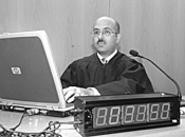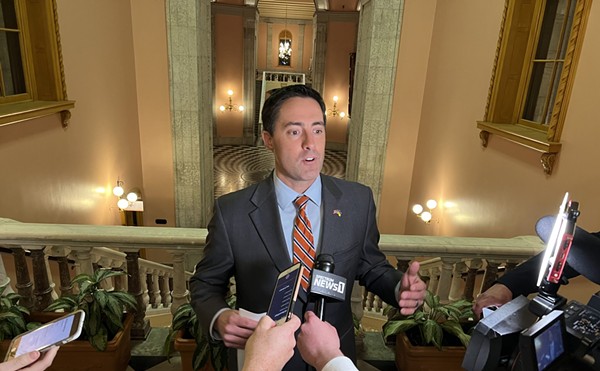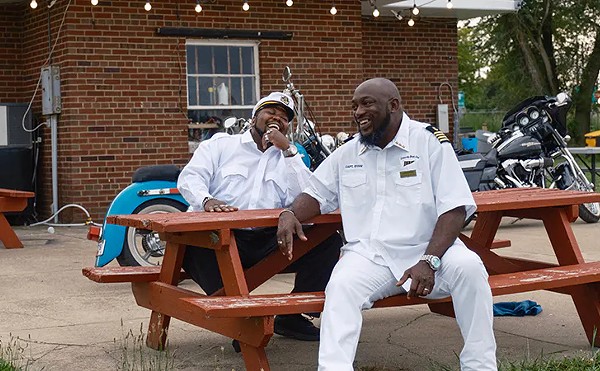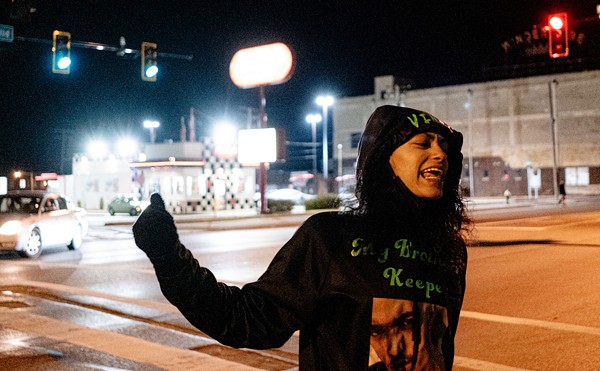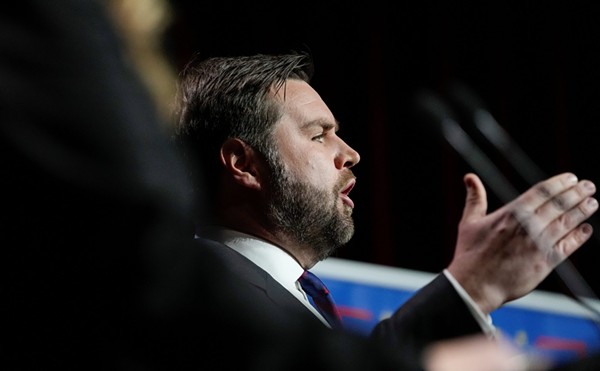But you've never met Judge Thomas Januzzi.
In Oberlin, drunk drivers are judged by a man so buttoned-down, he makes your average lawyer look like a Slayer roadie. To stay out of jail, defendants are subjected to the strictest release conditions in the state -- and given stern lectures to go with them. In fact, in his three-plus years on the bench, it seems as if the only woozy criminal Januzzi has gone easy on was Snoop Dogg.
"These people have problems, and they're likely to hurt themselves," the judge says of habitual drunks. "I wanna do the right thing."
But there's some debate over whether what Januzzi considers right is actually right. Defense lawyers question the stringent conditions he imposes on those seeking bail. And while most lawyers are cautious about openly criticizing the municipal judge, they privately refer to him as "anal," "micromanaging," and unfair.
After replacing a well-liked longtime judge in 2002, Januzzi quickly made the court his own. He required defendants to show up for hearings they previously could have skipped. He wrote multi-page decisions on such trivial matters as speeding tickets. And, some lawyers say, he stopped cutting deals -- even when prosecutors and defense lawyers agreed.
"A lot of defense attorneys don't like him," says Amherst prosecutor Scott Serazin. "They just want to show up and have a [deal cut] because they're there. They don't like [the change], because that's not the way it was."
Januzzi's austere beliefs -- and his gift for making himself unpopular -- go back to his days at Ashland College. As a student there, he ratted on students in his dorm for pulling a fire alarm, then testified against them at trial. But the kids walked. "How could the prosecutors not get a conviction?" he asks, still frustrated.
He rarely drinks -- not since the 1980s, when he watched a colleague's legal career tarnished by a drunk-driving conviction. When his kids were young, he wouldn't even have a glass of wine at home, in case he needed to drive them to the hospital.
Januzzi does have a soft side. In 2002, he agreed to erase a 30-day sentence for Snoop Dogg, after state troopers found weed on the rapper's tour bus. It was an example, the judge says, of his willingness to honor deals made between prosecutors and defense lawyers.
That same year, he made the papers when he cleaned up the toilet paper from an 85-year-old man's yard, which had been inexplicably TP'd. "Did a good job, too," the old man told The Plain Dealer.
"What you hear from attorneys is, he tries to save the world, and he tries to save everybody," says defense lawyer Richard Ramsey. "A lot of attorneys don't want to get mixed up in that. Judge Januzzi thinks it's his job."
Just ask Brett Sawyer.
When Sawyer was pulled over by Wellington police last year, he already had one drunk-driving conviction on his record. In many other courts, Sawyer might have been released on bond by paying a hefty fee and having his license suspended. But not in Oberlin.
Januzzi released Sawyer only after he agreed not to drink -- even at home. He was required to undergo an alcohol assessment. He couldn't drive. And he would be subject to random urine tests.
All this before he even went to trial.
Januzzi says the conditions were perfectly legal. He's also been known to force defendants to carry breathalyzer monitoring devices. If the monitor goes off, the defendant has to blow. And if there's booze on his breath, it's back to court.
But such bond conditions are supposed to be used only when there's a clear connection to the crime. A guy hits his girlfriend; he can't go near her while awaiting trial. That sort of thing.
Januzzi's stricter use of the rule "is completely destroying the concept of innocent until proven guilty," says DUI lawyer John Saia. "If that individual is exonerated, there's no way to make up for . . . those conditions that were imposed."
Januzzi's tough love didn't stop with Sawyer's bail. After Sawyer was arrested on drunk-driving charges, his lawyer, Doug Merril, struck a deal with prosecutors to have the charge reduced to reckless operation. The arresting officer agreed. But Januzzi wouldn't approve the deal. He interviewed the officer and thought the prosecutor could get a DUI conviction.
Merril was infuriated. "I'm done talking to you about this," he told Januzzi, snatching the case file from the judge's desk, according to court records. The rift widened, and Januzzi eventually removed himself from the case to ensure fairness. An acting judge quickly approved the lawyers' deal.
When it comes to drunk drivers, however, Januzzi is unwavering. He readily rattles off the statistics behind his inflexibility -- there are, he says, 300,000 Ohioans with multiple drunk-driving convictions. "You don't want them to get the idea they're not accountable for their actions," he says.
The judge even asks defendants in DUI cases whether they carry pictures of their children, Serazin says. If they do, he asks to see them. Anytime you feel you want to have a drink, he tells defendants, I want you to pull your pictures out and remember them, and remember your obligation to them.

